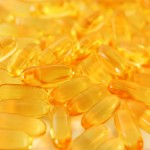A while back (actually in March 2010) I accompanied my wife on a trip to Phoenix where she was going to attend an Integrative Mental Health Conference with Dr Andrew Weil as the co-director. One of the sessions she attended was on new methods for treating depression.
Among the alternative medicine approaches to this major issue, said to be the world's fourth leading cause of morbidity and death, is the use of Omega-3 supplements. The notes from the conference intrigued me, especially since we were already taking fish oil.
So we've both dug into the literature and talked to others about fish oil and omega 3s. I just watched a video on the National Library of Medicine's MedlinePlus site and printed off articles from that website, Science Daily and the University of Maryland Medical Center and read portions of a book, The Omega-3 Connection published in 2001 by a Harvard researcher.
So here's my take on Omega 3s.
They are helpful in lowering triglyceride levels, likely effective for preventing heart attacks and possibly are effective for a host of other conditions, including depression.
You can get them from oily fish, but eating large amounts of fish may expose you to mercury, dioxin and PCBs; the NIH feels it's well worth the risk to eat fish, at least moderately. If you do eat fish several times a week, bake or broil them, don't fry them or eat so-called fish sandwiches.
Fish oil supplements appear to help a number of conditions, although the evidence seems mixed. I think the real benefit likely comes from taking a moderate dose of fish oil, using a good brand and keeping the bottle in the dark and probably in the freezer.
The use of high-dose fish oil should be restricted to people who are under the care of an experienced physician. We take two capsules a day and some of the research results I read about would require 12 or more capsules.
High doses of fish oil can reduce your ability for blood clotting and therefore increase the risk of strokes and other bleeding problems. I'd avoid it if I were on blood-thinners (e.g., Coumadin) or high-dose aspirin.
When it comes to depression (and I'm talking about so-called unipolar depression, not bipolar (severe mood swings, what used to be called manic-depressive disorder), a number of studies seem to show the EPA fatty acid in fish oil works, not the DHA.
If you're on an anti-depressive medication, taking a small amount of fish oil may help potentiate the drug's effect. Again, using large amounts of fish oil without any medication could be effective, but must be restricted to Rxs from an experienced physician.
And, fish oil may also potentiate the efects of anti-hypertensive meds. So if you're on one and start taking fish oil capsules, have your blood pressure checked several times.
But, having read as much as I have on fish oil, I'm certainly going to keep taking it. When taken in low doses, the MedlinePlus website says "it's likely safe for most people." And my bet is it can help a lot of us.


